Virohan Allied & Healthcare Programs
Allied & Healthcare programs | 20+ Partner Universities & Institutes | 98% placement record

The topic PCR is from the chapter Biotechnology: Principles and Processes. According to the analysis of the past five years' NEET papers, 20 questions were asked from the chapter - Biotechnology: Principles and Processes, which has approximately 9% weightage of the total questions asked from Zoology. Out of 20, five questions were based on the PCR concept alone. You will find those questions from PCR at the end of the article. Let's understand the PCR in detail.
The National Testing Agency (NTA) has activated the NEET UG 2026 application form link on the official website. Students can register themselves at neet.nta.nic.in.
The polymerase chain reaction, commonly referred to as PCR, is a technique used to create multiple copies of a certain segment of DNA in vitro. Kary Mullis, an American biochemist, developed this technique in 1983. PCR technique is used to generate millions of copies of a DNA segment. It allows the scientist to amplify a very small DNA sample to a large amount for a detailed study. PCR is usually used in biotechnology labs, several areas of biology and in medicine such as medical diagnostics, molecular biology research and even in some areas of ecology. The goal of PCR is to produce amplified DNA so that it can be analysed or used.
DNA Template - The DNA of interest to be amplified.
Taq Polymerase - It is a DNA polymerase I. PCR requires the enzyme DNA polymerase to synthesise new strands of DNA. The DNA polymerase used in PCR is known as Taq polymerase. As it is isolated from the heat-tolerant bacterium Thermus aquaticus, this enzyme can withstand high temperatures.
Allied & Healthcare programs | 20+ Partner Universities & Institutes | 98% placement record
T. aquaticus resides in hot water springs and its DNA polymerase is heat stable and remains most active at about 70 degrees celsius - the temperature at which DNA polymerase of E. coli and humans would be non-functional. As the high temperature is repeatedly used in PCR to denature the DNA strands, the Taq polymerase is considered ideal for PCR due to its high heat stability.
Primers -
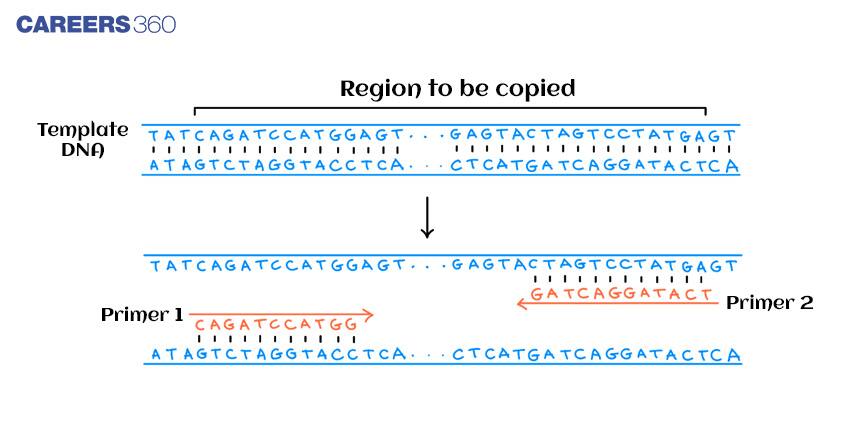
They are short chemically synthesised oligonucleotides, single-stranded DNA complementary to that particular segment of DNA to be amplified. The 2 primers that are used in each PCR are designed in a way to flank the target region of the DNA - region to be copied or amplified. The primers bind to the template strand via complementary base pairing. After binding they can be extended due to the action of DNA polymerase.
dNTPs - It is deoxyribonucleotide triphosphate, the building block to synthesise DNA. The energy required for the polymerisation is provided by them as well. The four common dNTPs used in PCR are adenine (dATP), thymine (dTTP), cytosine (dCTP), and guanine (dGTP).
Buffer - Potassium and Magnesium present in the buffer solution provide optimum conditions for denaturation and renaturation of DNA. Buffers also play an important role in polymerase activity, stability, and fidelity.
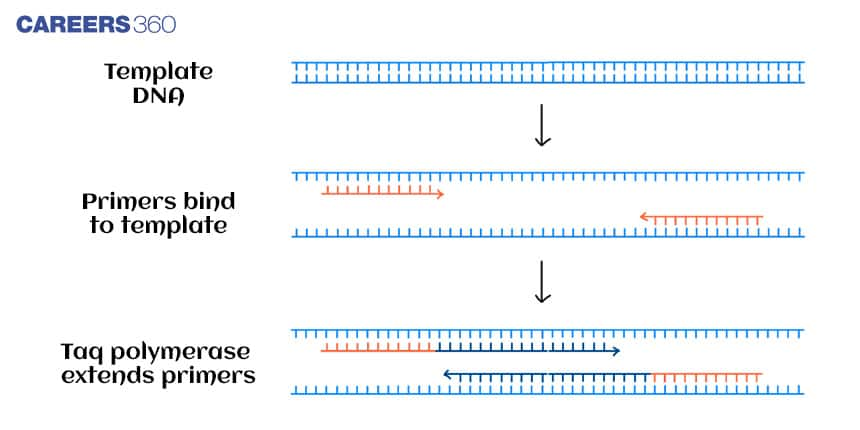
The technique is based on the replication of DNA using enzymes and majorly relies on thermal cycling. A particular segment of DNA is amplified in vitro - in an artificial environment outside the body - to make new strands of DNA using the existing strand as a template, enzyme Taq DNA polymerase and two sets of primers. This particular segment of DNA to be amplified can be a gene of interest for a researcher, a genetic marker used in forensic science to match the DNA from the crime scene with that of the suspects or a gene whose function is to be determined by the experimenter.
What are the steps in correct order involved in a polymerase chain reaction?
The key ingredients used in polymerase chain reaction are template DNA, primers, DNA polymerase i.e. Taq Polymerase, and nucleotides - the DNA building blocks. All the ingredients are kept in a tube along with the co-factors required by the enzyme. Then the tube goes through the repeated cycle of heating and cooling and thus new strands of DNA are synthesised from the template DNA.
What has happened inside the tube due to repeated heating and cooling?
Each cycle of PCR includes three steps:- 
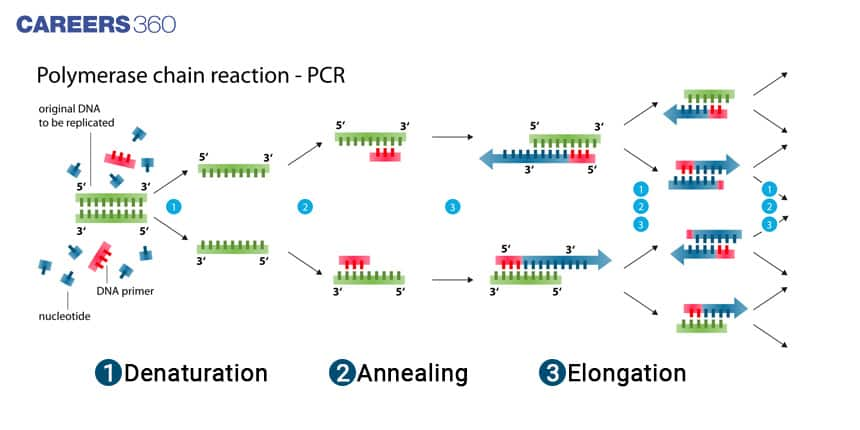
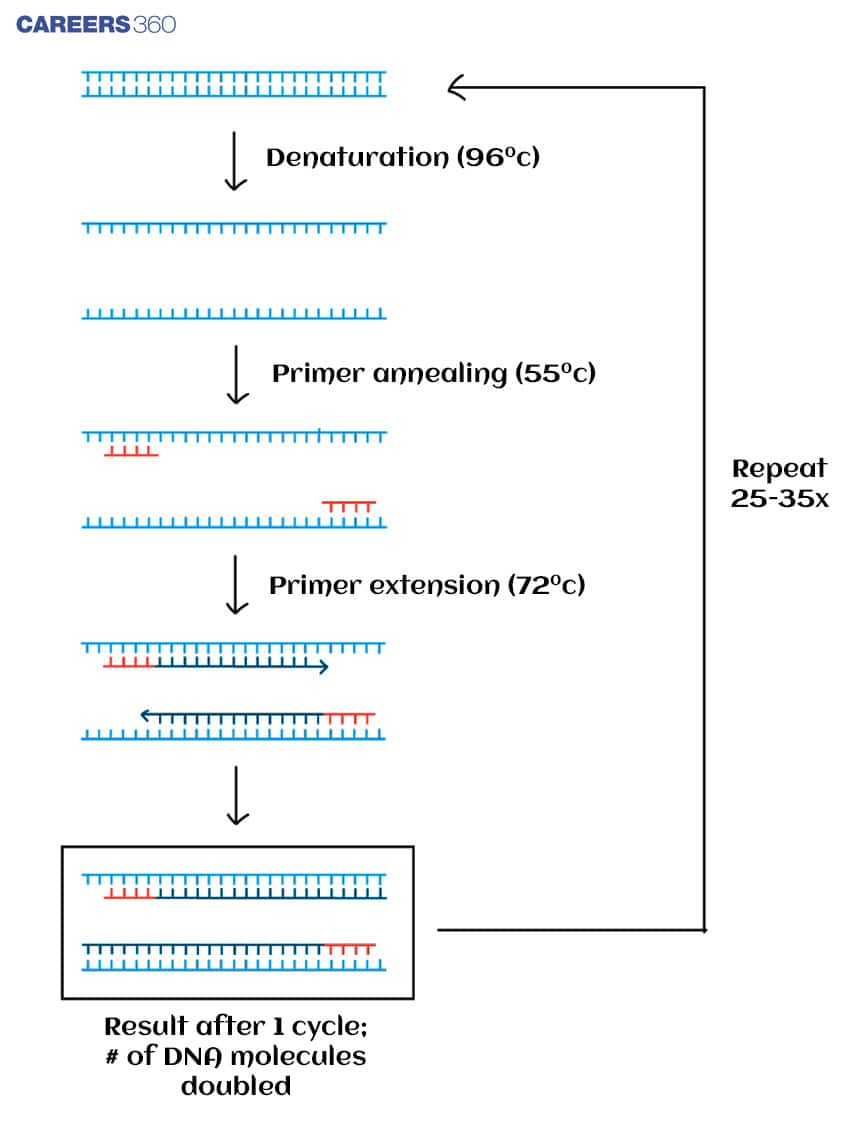
The first step is denaturation in which double-stranded DNA is separated by heating the sample. It takes place at about 94 degrees Celsius for about 30 seconds. At this temperature, the hydrogen bonds between the base pairs are broken and thus single-stranded DNA is obtained for the next step.
In the second step of PCR, the temperature is lowered up to about 54 to 64 degrees celsius. This cooling allows primers to bind their complementary sequences on the template strand. The two primers - a forward primer and a reverse primer - bind to the 2 separated template strands running in opposite directions. After complementary base pairing, DNA polymerase binds at primer-template hybrid and initiates the DNA synthesis. Thus, primers act as initiating points for DNA synthesis.
In this step, the temperature is again raised to 72 degrees celsius. For elongation or extension, a thermostable DNA polymerase is used - Taq polymerase. Taq Polymerase extends the primers by adding the nucleotides - 1000 base pairs per minute under the optimum conditions - in the 5’ to 3’ direction and thus the complementary strand of the DNA template is synthesised. As a result of 1 cycle of PCR, a double-stranded molecule is obtained in which one is a newly synthesised strand and another is an original strand.
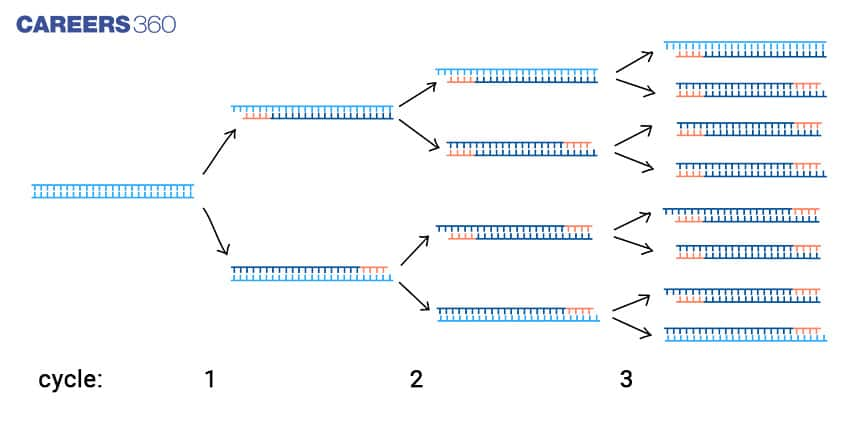
This cycle of 3 steps is repeated many times to get billions of copies in a very short period. In a typical PCR reaction, the cycle is repeated 25–35 times and it usually takes 2-4 hours. However, the time taken depends on the number of cycles and the length of the DNA region to be copied. The results of PCR can be visualised using gel electrophoresis.
The original DNA segment is not used as a template each time. The newly formed DNA in one round can serve as a template in the next round. Numerous molecules of Taq polymerase and copies of primers float around the reaction. So, molecules of DNA roughly double in each round of cycling as shown in the diagram above.
PCR is applied in many research labs as an essential tool in research and biotechnology. It has numerous practical applications in diagnostics, forensics, and genetic testing. PCR is a susceptible technique and provides results rapidly. The desired gene can be turned into millions and billions of copies that can be utilised for several purposes such as analysis, cloning and sequencing. Some of the essential applications in various fields are given below:
PCR can be used to diagnose the presence of a viral or bacterial genome in the host cell even before the onset of the disease. For example, the viral load can be detected using the PCR technique: RT-PCR is used to detect the presence of the SARS-CoV-2 viral genome.
To compare the genome of two organisms in genomic studies
To study gene expression
Gene Mapping
To create the mutant genes to study site-directed mutagenesis
Used as a tool in genetic fingerprinting.
Identifying the criminal from the suspects- A small DNA sample collected from the crime site can be amplified to analyse and compare with that of the suspects
Paternity tests
The gene of interest is amplified using PCR and then inserted into a vector for cloning.
Ancient DNA samples can be detected and analysed using PCR
Question 1: What is PCR?
Answer: It is a technique used to create multiple copies of a certain segment of DNA in vitro. Kary Mullis, an American biochemist, developed this technique in 1983. Generating millions of copies of a DNA segment has been possible because of the PCR technique. It allows the scientist to amplify a very small DNA sample to a large amount for a detailed study.
Question 2: The correct order of steps in Polymerase Chain Reaction (PCR) is________. (NEET 2018)
Answer: The correct order in which polymerase chain reaction takes place is:
Denaturation
Annealing
Elongation or Extension
Question 3. What is the importance of PCR?
Answer: PCR is applied in many research labs as an essential tool in research and biotechnology. It has numerous practical applications in diagnostics, forensics, and genetic testing. PCR is a susceptible technique and provides results rapidly. The desired gene can be turned into millions and billions of copies that can be utilised for several purposes such as analysis, cloning and sequencing.
Question 4: During the process of gene amplification using PCR, if a very high temperature is not maintained in the beginning, then which step of PCR will be affected first? (NEET 2021)
Answer: Denaturation
In denaturation, the double-stranded DNA is separated by heating the sample. It takes place at about 94 degrees celsius for about 30 seconds. At this temperature, the hydrogen bonds between the base pairs are broken and thus single-stranded DNA is obtained for the next step.
Question 5: Which of the following is not an application of PCR (Polymerase Chain Reactionando)? (NEET 2021)
(A) Molecular diagnosis
(B) Gene amplification,
(C) Purification of the isolated protein,
(D) Detection of gene mutation.
Answer: (C) Purification of the isolated protein.
Some important areas of application of PCR are given below:
(i) Diagnosis of pathogens
(ii) Diagnosis of a specific mutation.
(iii) DNA fingerprinting
(iv) Detection of specific microorganisms
(v) In prenatal diagnosis
(vi) Diagnosis of plant pathogens
(vii) In palaeontology
On Question asked by student community
Hi Gawade,
please refer to this article -
https://medicine.careers360.com/articles/neet-ug-mock-tests
You can find the mock test link here
Government Medical Colleges in states like Rajasthan, Uttar Pradesh, Madhya Pradesh, Bihar, Haryana, Punjab, Gujarat, Maharashtra
You still have enough time. For NEET 2026 (drop year, 3 months left), focus on:
NCERT linebyline for highweightage chapters (Human Physiology, Plant Physiology, Cell, Biomolecules, Biological Classification, Plant/Animal Kingdom, Genetics, Ecology)
Daily chapterwise MCQs + PYQs and weekly full mocks with proper analysis
Useful Careers360 links for planning:
NEET
The
NEET cut off 2025
for PwD (handicapped) candidates in Telangana was set at 40th percentile with 126 - 113 marks. Admission to government colleges in Telangana require higher marks as many as over 500 marks in NEET.
For more information, check the given below link.
https://medicine.careers360.com/articles/neet-cutoff-telangana
If a candidate qualifies for NEET PG only after the revision or reduction of the qualifying cut-off, registration for counselling is allowed only if the counselling authority opens a fresh registration or re-registration window for newly qualified candidates. If the system currently shows “you have not registered” and does not
Allied & Healthcare programs | 20+ Partner Universities & Institutes | 98% placement record
Get Job-Ready with New-Age Allied Health Programmes
Get Job Ready in Healthcare | Employability-Focused Programs
Amongst top 3% universities globally (QS Rankings) | Wide Range of scholarships available
Ranked #19 by NIRF, NAAC A++ Accredited | Recognized by dental council of India
Ranked #18 by NIRF, NAAC A++ Accredited | Unmatched clinical exposure with over 7 lakh patients yearly